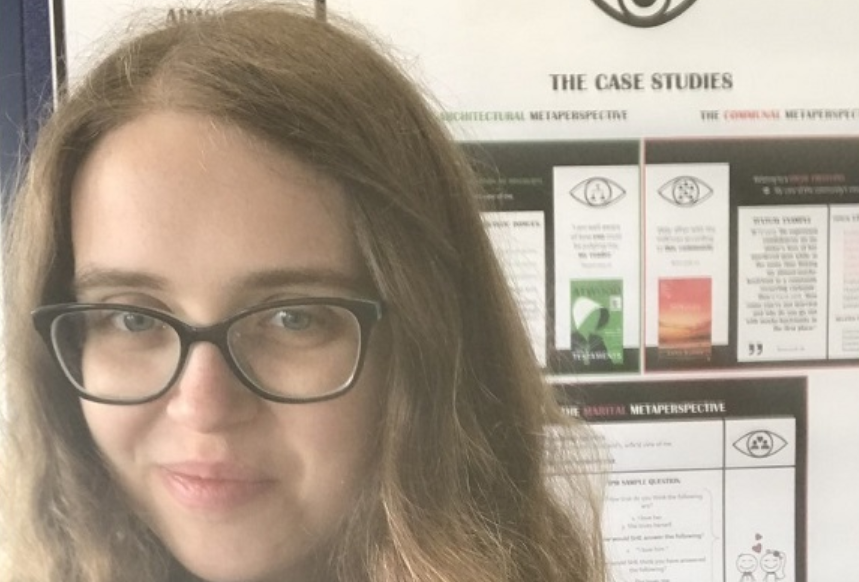Becoming an Expert: Metaperspectives in Language and Literature
Published on

Naomi Adam is a final-year PhD student in the Department of English, specialising in English Literary Linguistics (Stylistics). Her research applies cognitive-poetic, linguistic and psychological theories to the study of contemporary, award-winning literature. In particular, she focuses upon the use of hypothesis and the metaperspective within her case-study novels.
Putting my thesis in perspective...
It’s estimated that humans spend between 30 and 50% of our time disengaged from the world around us. Instead, a significant chunk of our mental minutes is given over to musings about events past, alternative presents, and possible futures. Indeed, life’s coulds, mights and maybes consistently come to dominate our cognitive landscape.
That’s why the social psychologists R.D. Laing, H. Phillipson and A.R. Lee state that the human race is ‘constantly supposing’ – and this includes speculation about what other people think of us. This interpersonal hypothesising – ‘what I think you think of me’ – the trio refer to as the metaperspective.
... and putting perspective in my thesis
Metaperspectives crop up all the time in day-to-day life. (People often say ‘I know what you think of me’, but rarely do they mean it literally.) I like to use the example of the buffet table, with when you visit it, and crucially what and how much you take, being influenced by your perception of other people’s perception of you: by your desire not to appear too greedy, or too picky, for instance.
The characters of novels cue metaperspectives too (and just as frequently), with the boon that in a literary context we can see exactly how these metaperspectives are both framed and phrased. Literature allows us to get inside the mind of a character to examine exactly what they think another character thinks of them, with works of literary fiction (including those awarded prestigious prizes like the [Man] Booker) particularly generous in relation to these character-internal insights. Novels of this genre tend to direct attention to the thoughts and feelings of the individuals which people their pages, as the case-study texts for my thesis confirm.
Things can only get meta
Across my thesis I concentrate on four central case studies – The Testaments (2019), by Margaret Atwood; Milkman (2018), by Anna Burns; A Brief History of Seven Killings (2014), by Marlon James; Lincoln in the Bardo (2017), by George Saunders – with each text prominently featuring a metaperspective in one guise or another (or, oftentimes, several). My research delves into the various possible permutations of the metaperspective, and the linguistic indices to which each attach. I demonstrate that metaperspectives are found in several different forms, dependent upon why, where, when and by whom they are built, and that this affects the language – the how – that signals their presence. In this way, textual and linguistic strategies on the micro-level are tied to literary and thematic preoccupations on the macro-level of the diverse novels under scrutiny. One novel presents the cruel doyenne of a dystopian dictatorship, who secretly ponders how her actions will be viewed by posterity; another involves a young woman victim-blamed so incessantly that she becomes wracked by paranoia about the community’s perception of her behaviour; yet another incorporates ghost protagonists with the fantastical capacity to enter into each other’s bodies and minds, making literal the ordinarily figurative notion of knowing what another thinks of you.
What I have found to be especially interesting is the tendency for press, public, and judging-panel responses to these novels to tally with the textual functioning of the metaperspective within the respective works. If Milkman, for instance, has been feted as ‘a tale of gossip and hearsay’, then this owes in large part to the distinctive stylistic texture brought about by a communally-inflected metaperspective that features throughout the novel. If the fictional character Kim Clarke from A Brief History of Seven Killings is received by the digital community of Goodreads as ‘human first and foremost’, it is likely because she is constantly constructing a metaperspective – a distinctly human trait.
This all comes despite the fact that the metaperspective is still to be mentioned in the (relatively scant) scholarship surrounding these novels. Nor, indeed, has it ever been applied to the study of the novel form more widely. Significantly, despite its experiential centrality, the term is even yet to appear as an entry in the Oxford English Dictionary.
Having successfully defended my thesis in March 2023, I hope to continue to promote the study of metaperspectives within the language of literary fiction. However, I see no reason why the concept should be limited to this specific context. Teaching on the undergraduate module Language and Literature (ENGL383) last semester led to the discovery of textual metaperspectives in situations as diverse as celebrity travelogues, Taylor Swift’s song lyrics and the tweets of Donald Trump. This suggests that metaperspectives are omnipresent; humans are, after all, ‘constantly supposing’!
You can follow Naomi on Twitter @naomibibliomi